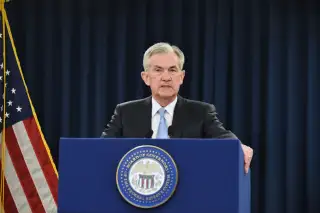Nervous About Stocks? There Are Great Opportunities in the Bond Market, According to Experts. Here's Where to Look

After years of enduring ultra-low interest rates, fixed-income investors are starting to see bond market opportunities. But amid increasing uncertainty about the strength of the U.S. economy, you need to be careful.
After raising short-term interest rates four times in 2018, to a high-end target of 2.5%, the Federal Reserve has indicated it expects no new fed funds rate hikes this year.
That means bond payouts, which have been climbing for several years, aren't likely to get any more generous in 2019. At the same time, bond prices, which move in the opposite direction as yields, could benefit. Vanguard Total Bond Market Index Fund has posted a total return -- a figure that includes both price appreciation and interest income -- of 4.1% over the past year.
The Fed "is really what is driving both the stock and bond markets,” says Donald Ellenberger, a senior portfolio manager at Federated Investors.
The upshot: There are still plenty of bargains to be had in the bond market if you know where to look -- and which risks are worth taking.
High Yield Means High Risk, High Reward
When the Fed halted interest rate hikes, it signaled that controlling inflation – which has sat near the 2% mark for some time – had given way to a bigger priority: boosting the economy's growth rate. As a result, stocks jumped -- and so did high-yield bonds.
High-yield bonds -- otherwise known as junk bonds -- tend to move more in tandem with stocks than with other bonds. The group has a 0.6 correlation to equities compared to a .14 correlation to U.S. Treasuries, according to Alliance Bernstein.
That's because as with stocks, the financial health of issuing companies is a top concern for investors. In a healthy economy these weaker, sometimes troubled companies often manage to scrap by. In a recession, investors face a real chance of default.
With S&P 500 posting a total return of nearly 14% so far this year, the iShares iBoxx $ High Yield Corporate Bond ETF (HYG) has gained 7.4%. Meanwhile, it boasts a 5.3% yield, compared to the S&P 500's 1.9%
Those numbers look attractive, but be careful. While the Fed's rate cut prompted an immediate stock market rally, it's also a sign that policymakers are worried about growth in the long-term.
"Even a defensive [junk bond] fund will be flat to negative in some sort of a recession or a sell-off," Morningstar's senior analyst Brian Moriarty said in a recent interview.
Protecting Against Inflation with TIPS
Just because inflation isn’t a concern today, doesn’t mean it won’t become one. It remains a future threat worth protecting against.
That’s where the Treasury Inflation Protected Securities (TIPS) come in. While TIPS pay a fixed interest rate, investors' principle is adjusted upwards or downwards with the Consumer Price Index.
Since inflation expectations remain low overall right now and the Fed has turned its attention from managing inflation to spurring economic growth, some investors think there's a chance for an inflation flare up. That's led to a rally in TIPS prices, sending yields, which move in opposite direction of prices, downwards. The yield on 10-Year TIPS has dropped from 0.98% to 0.58% at the start of 2019.
Either way, they can serve as a useful hedge, adds Ellenberger, in case inflation does become an issue again.
Muni Bonds
The 2017 tax reform was both a boon and a bust for municipal bonds.
On the plus side, wealthier individuals in high-tax states saw the amount of state and local taxes they could write off on their federal income taxes capped at $10,000. Investing more in muni bonds is a tactic that some have used to counter this change, since muni bond income can still be reaped tax-free.
Even with yields a little below those of other bonds, munis can still prove more profitable since you’re not paying taxes on the income. Currently Vanguard Intermediate-Term Bond Index Fund yields 3%, compared to 2.1% for Vanguard Intermediate-Term Tax Exempt, the equivalent muni fund.
Overall demand for municipal bonds, however, has dropped because the tax law also reduced corporate tax rates. This has kept banks on the sidelines. But munis aren’t very sensitive to changes in the Fed’s interest rate, since they’re valued more in terms of the local governments’ abilities to collect revenues, says Ellenberger.
They’ve shown signs of strength over the past year, as the tax reform becomes ingrained. Vanguard Intermediate-Term Tax Exempt has returned 5.1% over the past year, compared 10-year average annual return of 4.1%.